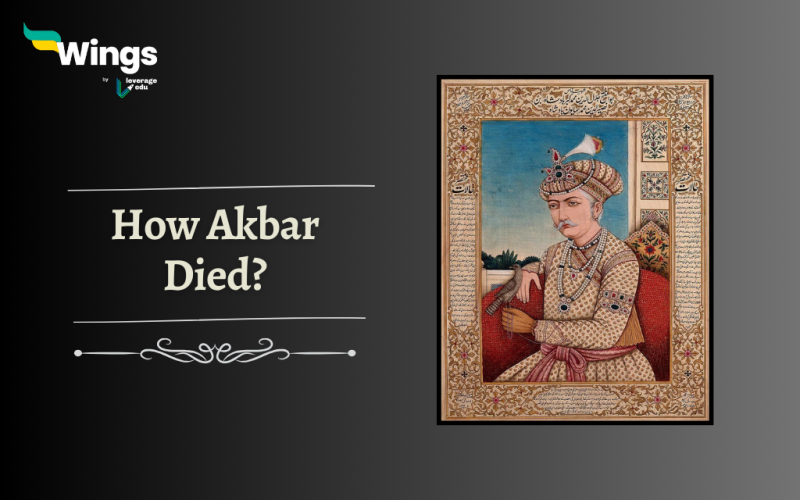The third Mughal Emperor of India, Jalal-ud-din-Muhammad Akbar died on October 27, 1605, at the age of 63. Akbar’s reign is considered a golden age in India’s history because of his progressive policies, military conquests and cultural achievements. However, like all great rulers, Akbar’s life also came to an end. In this article, we will explore the question: How Akbar died?

Who was Emperor Akbar?
Akbar was born in 1542 and became emperor at the young age of 13 after the death of his father, Humayun. He quickly established himself as a charismatic and visionary leader, implementing policies of religious tolerance and cultural exchange that set him apart from his predecessors. Akbar’s court was known for its diverse mix of scholars, poets, artists, and intellectuals known as navratnas of Akbar, creating a vibrant atmosphere of creativity and innovation.
Also Read – Emperor Akbar: History, Life, Achievements
Illness and Last Days
Toward the end of his life, Akbar suffered from a severe case of dysentery, which is a gastrointestinal infection that causes diarrhoea with blood. Despite receiving medical treatment from his physicians, including Hakim Humam and Hakim Ali, Akbar’s condition continued to deteriorate. In his final days, Akbar’s health rapidly declined and he became increasingly weak and frail.
Akbar’s Death
On the day of his death, Akbar requested to be taken to a place where he could be closer to nature. Surrounded by lush greenery and beautiful flowers, Akbar spent his final hours in peace and tranquillity.
On the evening of October 27, 1605, Akbar took his last breath. Death of Akbar marked the end of an era in Mughal history. He was buried in the mausoleum which was built by him at Sikandra on the outskirts of Agra.
The circumstances surrounding his death, however, are a subject of much debate among historians and scholars. Some believe that Akbar died of natural causes, while others speculate that he was poisoned by his son, Jahangir, in a bid to seize the throne but this is not substantiated by any proof. However, Jahangir later went on to succeed his father, as the fourth Mughal Emperor.
Also Read – History of Fatehpur Sikri: Features, Facts & More
In conclusion, the death of Akbar was a sombre event that marked the end of a golden era in Mughal history. During his reign, Akbar expanded the Mughal Empire through a series of military conquests and strategic alliances. He built cities, forts, and palaces that still stand as living proof of his grandeur and vision. Akbar’s administrative reforms, such as the integration of local rulers into the imperial system and the establishment of a land revenue system based on productivity, helped to solidify the empire’s stability and prosperity.
Relevant Blogs
| Muhammad Ghori | Mahmud Ghazni? |
| Megasthenes | Who was Ibn Battuta |
| Prithviraj Chauhan | Aurangzeb |
| Maharana Pratap | Babur |
| Ashoka | Shah Jahan |
This was all about how Akbar Died. If you want to know more about topics like this, then visit our general knowledge page! Alternatively, you can also read our blog on general knowledge for competitive exams!
 One app for all your study abroad needs
One app for all your study abroad needs













